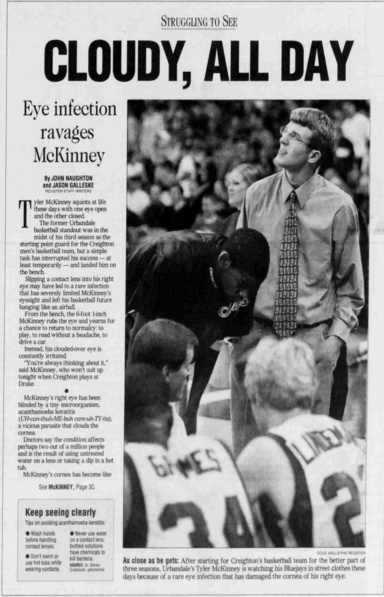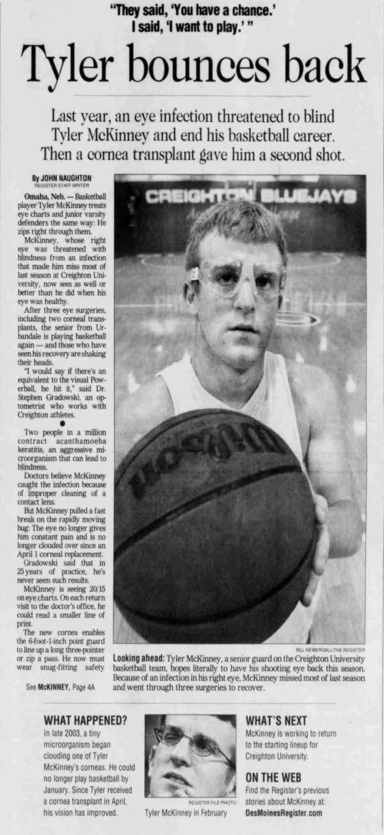In 2025, Iowa Lions Eye Bank will mark its 70th anniversary. To celebrate, we are posting occasional features about people who have either had an impact on, or been impacted by, the eye bank over the years.
Tyler McKinney was a junior and the starting point guard for Creighton University’s men’s basketball team in late 2003 when he was sidelined with an eye infection called acanthamoeba keratitis.
McKinney isn’t sure how he contracted the infection in his right eye, but his best guess is that it happened when he was in Canada during a preseason basketball trip.

“I had worn contacts for approximately 10 years, and always had cleaned my contact case with water,” McKinney says. “I did the same, then and like always, used ReNu contact solution for storing my contacts.”
McKinney says the infection was initially mild and he thought it was just pink eye.
“I tried to keep playing for a while, but after a two-game road trip I was unable to see, even dribbling out of bounds twice because I couldn’t see the out of bounds line,” McKinney says. “Within a month, it started to really hurt, and the light sensitivity was very bad.”
Soon, McKinney says, he was spending most of his time in his bedroom with the lights off. He saw a cornea specialist in Omaha but was soon referred for an appointment with Dr. John Sutphin in Iowa City, who was also serving as the medical director at Iowa Lions Eye Bank.
McKinney was hospitalized to try to remove the infection, and Sutphin told McKinney to administer more than 100 drops a day into his eye. When that didn’t solve the problem, McKinney was told he was going to need to have a cornea transplant, with tissue recovered, evaluated, and distributed by Iowa Lions Eye Bank.
“I had my first transplant in early 2004,” McKinney says. “The pain was instantly better, and I thought I was on the way to recovery.”
However, not all the infection was removed, and McKinney was told the only options were to either lose his eye, or go on an even more aggressive form of treatment, which he said included more than 100 eye drops a day as well as an IV drip twice a day for nearly a month. McKinney then had a second transplant on April 1, 2004, before undergoing another procedure a short time later.
McKinney says he was unable to work out or even lift a backpack for nearly three months and planned to redshirt his senior year. However, in late August 2004, his doctor cleared him to begin physical activity.
“I was able to start playing basketball again in mid-September, as my coaches wanted me to play that year,” McKinney says. “It was extremely challenging to try and prepare for Division I basketball after not doing any physical activity for eight months.”
As he was trying to get back into shape, McKinney says he developed stress fractures in his shins, which he ended up having to deal with his entire senior year.

“Thankfully, we ended up having a good year and we ended up winning our conference basketball tournament and played in the NCAA Tournament against West Virginia,” McKinney says.
In the years since his transplants, McKinney says his vision has not been as good as it was prior to the infection.
“But I am just thankful I can see a little bit,” McKinney says. “I have not needed another transplant, but I mostly likely will need one later in life. I use some eyedrops if needed, but that is a rarity.”
McKinney says he is grateful that health care has advanced to the point where he could have a cornea transplant.
“I often think if I was born earlier, I would be living with one eye or even worse,” McKinney says. “The procedure was fairly simple and pain free, the tough part was the recovery and not being able to be active when you feel so much better.”
McKinney says he wrote to his cornea donors and told them how their gifts changed his life. “I went over what I went through and how thankful I was to get this gift.”
Publicizing his story in 2004 led McKinney to where he is now. He lives in Austin, Texas, and works in medical device sales.
“After my story was published, some medical device companies actually reached out to me, and I ended up working for them and that led to my career,” McKinney says.
McKinney says he is a registered eye, organ and tissue donor, and being a cornea recipient “100 percent changed why” he decided to be a donor.
“Before, I just never thought about it so marked no,” he says. “After the transplant, I realized how you can change someone’s life by being a donor.”
